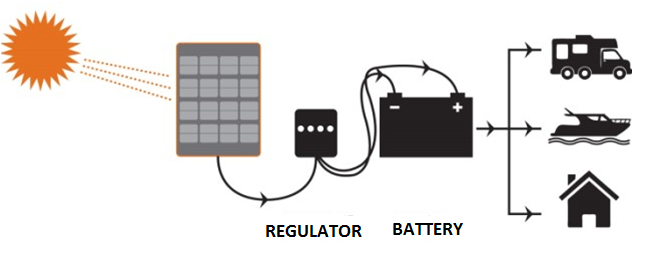The Tregoo photovoltaic panels have to be connected to a battery through a charge controller.

The Tregoo photovoltaic panels of the ThinLight and Nano series are designed and optimized to recharge batteries used in a wide variety of applications, such as in the marine and camper industry or any use in free time.
|
THINLIGHT 130 |
|
| Peak power, Pmax (Wp) | 130 |
| Tolerance (%) | ±3 |
| Open circuit voltage, Voc (V) | 20,04 |
| Short circuit current, Isc (A) | 8,42 |
| Tension at Pmax, Vmp (V) | 16,76 |
| Current at Pmax, Imp (A) | 7,85 |
| Temperature coefficient of short circuit current (%/°C) | +0,043 |
| Temperature coefficient of open circuit voltage (%/°C) | -0,299 |
| Temperature coefficient of maximum power (%/°C) | -0,465 |
| Fill factor (FF) (%) | 78 |
| Operative temperature (°C) | -40÷85 |
| NOCT (°C) | 47,5 |
| Module material | UV resistant transparent polymer |
| Size (bxh) (mm) | 1350 x 660 |
| Thickness (mm) | 1,7 |
| Weight (kg) | 2,20 |
| Max system voltage (V) | 1000 |
| Cells | n.32 m-Si 156x156 2BB |
| Terminal ends | Cables lenght 1m - standard MC4 plugs |
| Bypass diode (A) | 12 |
Q & A
Q - How can panels get fixed?
A - The panels can get fixed in three ways: mechanically through the eyelets (optional), for double-sided binding, for glue binding. The choice is to be made according to the different expansion of the support surface. For further information, see the application manual.
Q - Are panels walkable?
A - It is possible to walk on the panel only barefoot (or wearing rubber soled shoes) when it is placed on a firm and flat continuous surface.
Q - What kind of maintenance do panels require?
A - Panels require very limited maintenance, because of the absence of moving parts. Maintenance consists of the following operations: regular cleaning of the module, periodic inspection, control and verification of electrical performances.
How to expose the panels
In order to achieve optimal performance of the panel, make sure it has the best orientation possible relative to the sun.
Best exposure
The surface of the solar panel is perpendicular compared to the rays of sunshine.

Good exposure
The surface of the solar panel is inclined compared to the rays of sunshine.

Worst exposure
The surface of the solar panel is parallel to the rays of sunshine.

Atmosphere and performance
Solar panels are tested in ideal conditions to verify their functioning.
In real conditions things may change, since the power generated by the panel is influenced by different factors, such as the orientation of the panel relative to the sun and weather conditions.
For example, with a clear sky and optimal orientation, the panel can make 100% nominal power. However, if the sky is clouded, the panel will make 50% even if its orientation relative to the sun is great.
Technology
The photovoltaic Tregoo panels are thin and light flexible monocrystalline modules.
They are made of thermoplastic technopolymers provided with high physical-mechanical characteristics. The absence of glass and frame makes them eight times lighter than rigid panels in crystalline silicon, (2Kg/sq m) and thin (1.7mm thickness).
Their efficiency is almost three times better than other flexible panels in amorphous silicon and are also made of totally recyclable plastic materials.
Tregoo panels are not afraid of damages caused by vibrations or high temperatures and are characterised by a high resistance to atmospheric agents. Moreover, the modules flexibility allows to apply panels even on curved surfaces.
Duration and conservation
Panels
Solar panels require very limited maintenance, thanks to the absence of moving parts.
The dirt accumulated on the surface over the photovoltaic cells can reduce their performances.
A regular cleaning of the panel, using fresh water, with non-abrasive sponges and without high pressure water jets, is sufficient.
Power Packs
If left unused for long periods, it is recommended to fully recharge the battery for 24 hours, every two-three months.
For the first use, it is advisable to fully recharge the battery for 24 hours.
Warranty
All products have 2 years warranty from the date of purchase with the formula “Send Back and Get a New One”:
- 1. Contact Customer Service and open a Ticket
- 2. Once the Ticket has been opened, the courier will collect the defective item.
- 3. Once the product has been received, Tregoo will send the client a new item for free.
Warranty includes structural and functional defects of the item. Damages due to misuse, scratches or normal wear, are not covered. For further information, see “Returns”.













